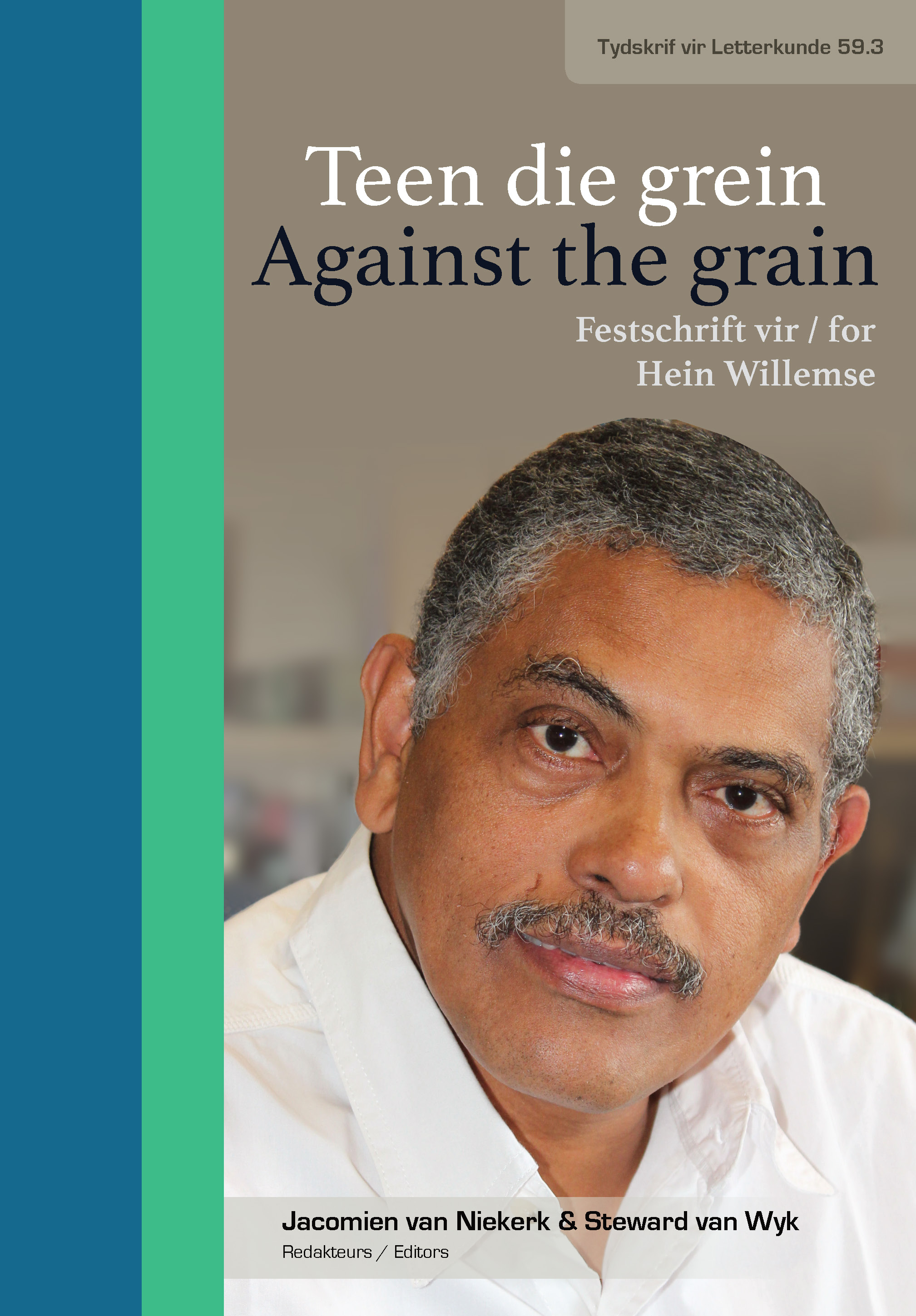The power of exclusion in the works of André Brink and Assia Djebar
DOI:
https://doi.org/10.17159/tl.v59i3.13304Keywords:
André Brink, Assia Djebar, spaces, exclusion, isolation, postcolonialAbstract
South African author André Brink and the Algerian Assia Djebar have been described as a uo of literature and struggle. Various parallels exist between the authors’ oeuvres: both authors strive to create a chain of voices for those who have been ignored or silenced; they attempt to re-evaluate the colonial experience while problematising the complexities of present-day South Africa and Algeria; their narratives foreground language, space, and power struggles between coloniser and colonised, master and slave, man and woman. Their characters represent a desire for freedom and the need for resistance in the quest for liberation. In this article I focus on the comparable role of space, and more specifically spaces of exclusion, in a selection of the authors’ works. Postcolonial theories serve as a framework for establishing Brink and Djebar’s similar stance regarding the notion of exclusion. Amongst others, Homi Bhabha’s concept of the ‘beyond’ and Édouard Glissant’s notion of ‘relation’ are employed to strengthen arguments made concerning the characters’ desire for movement which results from them being excluded from certain spaces. In this article I demonstrate how their characters feel attracted to cross borders that exclude in a quest for inclusion. An endless, open, and powerful movement is the result of the opposing forces of exclusion and attraction their characters experience.
Downloads
References
Bhabha, Homi K. The Location of Culture. Routledge, 1994.
Burger, Willie & Karina Magdalena Szczurek, eds. “Introduction.” Contrary: Critical Responses to the Novels of André Brink. Protea, 2013, pp. 9–22.
Brink, André. Duiwelskloof. Human & Rousseau, 1998.
Brink, André. Inteendeel. Human & Rousseau, 1993.
Brink, André. Kennis van die aand. Human & Rousseau, 1973.
Brink, André.’n Oomblik in die wind. AD Donker, 1975.
Brink, André. Philida. Human & Rousseau, 2012.
Chanda, Tirthankar. “André Brink et Assia Djebar, un duo africain de lettres et de combats.” RFI. 13 Feb. 2015. http://www.rfi.fr/hebdo/20150213-litterature-algerie-afrique-sud-france-andre-brink-assia-djebar-engagement-imagination-disparition.
Deleuze, Gilles & Félix Guattari. A thousand plateaus: capitalism and schizophrenia, translated by Brian Massumi. U of Minnesota P, 1987.
Djebar, Assia. L’Amour, la fantasia. Albin Michel, 1985.
Djebar, Assia. La femme sans sépulture. Albin Michel, 2002.
Djebar, Assia. Nulle part dans la maison de mon père. Actes sud, 2007.
Djebar, Assia. Ombre sultane. Albin Michel, 1987.
Djebar, Assia. Vaste est la prison. Albin Michel, 1995.
Duncan, Nancy, ed. Body Space: Destabilizing Geographies of Gender and Sexuality. Routledge, 1996.
Faulkner, Rita. “Assia Djebar, Frantz Fanon, Women, Veils, and Land.” World Literature Today vol. 70, no. 4, 1996, pp. 847–55. DOI: https://doi.org/10.2307/40152312.
Glissant, Édouard. Poétique de la relation. Gallimard, 1990.
Gregory, Derek. Geographical Imaginations. Blackwell, 1994.
Hiddleston, Jane. Assia Djebar: Out of Algeria. Liverpool U P, 2006.
Hirchi, Mohammed. “Déambulations aux confins de la langue et de la mémoire collective: le cas d’Assia Djebar.” International Journal of Francophone Studies vol. 6, no. 2, 2003, pp. 87–102. DOI: https://doi.org/10.1386/ijfs.6.2.87/0.
Kossew, Sue. Pen and Power: A Post-Colonial Reading of J. M. Coetzee and André Brink. Rodopi, 1996.
McDowell, Linda. “Spatializing Feminism: Geographic perspectives.” Body Space: Destabilizing Geographies of Gender and Sexuality, edited by Nancy Duncan. Routledge, 1996. pp. 28–44.
Mortimer, Mildred. “Language and space in the fiction of Assia Djebar and Leila Sebbar.” Research in African Literatures vol. 19, no. 3, 1988, pp. 301–11. https://www.jstor.org/stable/3819369.
Murray, Jenny. Remembering the (Post)Colonial Self: Memory and Identity in the Novels of Assia Djebar. Peter Lang, 2008.
Ringrose, Priscilla. Assia Djebar in Dialogue with Feminisms. Rodopi, 2006.
Rose, Gillian. “As if the mirrors had bled: Masculine dwelling, masculinist theory and feminist masquerade.” Body Space: Destabilizing Geographies of Gender and Sexuality, edited by Nancy Duncan. Routledge, 1996, pp. 56–74.
Sadiqi, Fatima et al., eds. Women Writing Africa: The Northern Region. The Feminist P at City U New York, 2009.
Sokołowicz, Malgorzata. “La recherche de soi dans la littérature postcoloniale: Entre Orient et Occident dans Nulle part dans la maison de mon père d’Assia Djebar.” Discourses on Nations and Identities: The Many Languages of Comparative Literature (Volume 3), edited by Daniel Syrovy. De Gruyter, 2021, pp. 341–52.
Viljoen, Louise. 2004. “Civilization and Wilderness: Colonial Spatial Binaries and the Construction of Contemporary South African Identity in André Brink’s An Instant in the Wind and Kirby van der Merwe’s Klapperhaar slaap nooit stil nie (One Can Never Sleep Quietly on a Coir Mattress).” Storyscapes: South African Perspectives on Literature, Space & Identity, edited by Hein Viljoen & Chris N. Van der Merwe. Peter Lang, 2004, pp. 137–53.
Wilson, Janet & Daria Tunca. “Postcolonial Thresholds: Gateways and Borders.” Journal of Postcolonial Writing vol. 51, no. 1, 2015, pp. 1–6. DOI: https://doi.org/10.1080/17449855.2014.988434.
Published
Issue
Section
License
Copyright (c) 2022 Tydskrif vir Letterkunde

This work is licensed under a Creative Commons Attribution-ShareAlike 4.0 International License.


 https://orcid.org/0000-0001-6465-6584
https://orcid.org/0000-0001-6465-6584


.png)